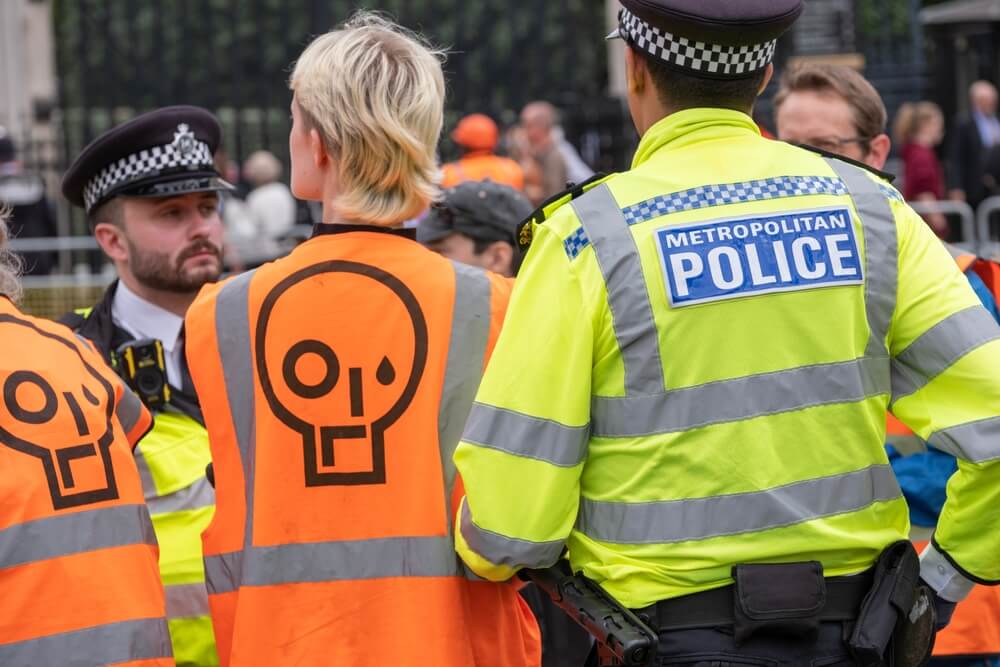More than a score of supporters of the Palestine Action protest group were arrested near the British parliament at the weekend, hours after a ban proscribing it as a terrorist organisation came into force.
The ban was approved by an overwhelming majority of MPs despite warnings from lawyers, free speech activists, and United Nations experts that the measure would have a chilling effect on political protest in the UK.
The direct action protest group has been involved in a series of disruptive assaults on targets linked to Israel and its arms industry. In its latest protest ahead of the ban, activists broke into a Royal Air Force base and spray-painted two transport planes of the type the group claimed has assisted Israeli military operations.
For the first time, such attacks on property will be considered acts of terrorism, subject to jail terms of up to 14 years, as opposed to previous definitions that they must pose a direct threat to human life. The terror ban extends to supporters of the group, even if they are not involved in direct action protests.
Crossing the legal threshold
A panel of experts attached to the UN Human Rights Council said before the ban that the UK has previously supported the view that “mere property damage, without endangering life, is not sufficiently serious to qualify as terrorism”. They noted that actions that damage property are already subject to criminal law.
A majority of MPs were nevertheless swayed by the government argument that Palestine Action’s tactics, which caused millions of pounds of damage, had crossed the legal threshold to be added to almost 100 organisations previously proscribed.
After failing in a last-minute legal action to avert the ban, the protest group thereby joined the likes of ISIS, Hamas, and a range of far-right organisations already outlawed under the UK’s 2000 Terrorism Act.
"Proscribing Palestine Action would not impinge on people's right to protest" - Dan Jarvis
Some who backed the ban in the 385-26 vote may have been influenced by the fact that it also covered two neo-Nazi groups - Maniacs Murder Cult and the Russian Imperial Movement - which were also banned in the motion that was passed.
Home Office minister Dan Jarvis had told the House of Commons that proscribing Palestine Action would not impinge on people's right to protest and that those who wished to lawfully protest or express support for Palestine could continue to do so.
Critics question Palestine Action ban
But has the government undermined the effectiveness of anti-terror laws by “using a sledgehammer to crack a nut,” as suggested by Tim Squirrell, a counter-terrorism expert, quoted by The Economist?
The weekly itself argued that a draconian approach to pro-Palestinian activism was likely to backfire if the heavy-handed use of anti-terror laws actually amplified the message of provocateurs.
The ban certainly did little to deter the protestors who turned out in Parliament Square on the day the ban came into force. The 29 detained included an 83-year-old retired priest, Sue Parfitt, who branded the ban as “total nonsense” as she was led away by police.
In a week in which the UK marked the 20th anniversary of the 7/7 London bombings, in which Islamist suicide bombers killed 52 people in multiple attacks on the capital’s transport system, there is no doubt that the UK continues to face a variety of terrorist threats.
“A Labour government, desperate to shore up its security credentials, jumped right in.”
Even at that time, however, there was political resistance to some of the measures proposed by Tony Blair’s government for its 2006 Terrorism Act. The Commons rejected a proposal to extend the detention of suspects to 90 days and settled for 28, a doubling of the provisions of the 2000 act.
Critics of the Palestine Action ban fear the excessive use of the terrorist designation risks further undermining the UK’s traditions of free speech and protest, potentially threatening other direct action groups.
The free speech OpenDemocracy news website noted that some Conservative MPs had wanted to use anti-terrorism provisions against groups such as the climate activists of Just Stop Oil and Insulate Britain, but that the previous government had pulled back from doing so. “A Labour government, desperate to shore up its security credentials, jumped right in.”
The true test of the ban
Vocal support for Palestine Action is likely to persist, whatever dampening effect the ban has on its direct action protests. The group has replaced its pre-ban website with the terse message that “Palestine Action is proscribed in Britain.
For that reason, the website has been transferred to others in the global movement who are not active in Britain or British nationals.”
 In recent years, a number of climate activists have received heavy sentences for involvement in direct action attacks
In recent years, a number of climate activists have received heavy sentences for involvement in direct action attacks
The true test of the ban may come if and when activists or their supporters face trial before a British jury.
In recent years, a number of climate activists have received heavy sentences for involvement in direct action attacks in which they have been found guilty of criminally destructive and disruptive acts.
In a number of other cases, however, juries have opted to acquit, sometimes ignoring the direction of presiding judges.
If MPs have overstepped the mark this time and threatened the UK’s free speech values in the process, they might still have to prove the validity of their argument to the potentially sceptical average man and woman in the street who make up Britain’s juries.